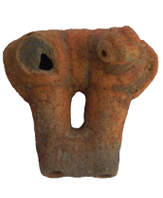The Osa Peninsula Heritage Project (OPHP)
The Osa Peninsula stands as a global treasure for its remarkable biological diversity, harboring keystone species within Costa Rica's most ecologically intact area. Despite its significance, our understanding of human interaction in this diverse ecosystem remains limited, with evidence suggesting human habitation for at least 1600 years, and possibly extending back as far as 15,000 years based on archaeological findings in neighboring regions. The challenging terrain of the Osa Peninsula contains numerous examples of ancient indigenous Costa Rican heritage. Expressions capturing the local flora and fauna are etched into ceramic and sculptural designs, with architectural remnants scattered across terraces, floodplains, and peaks. Unfortunately, many of these sites are not documented and face threats from looting and encroaching development.The potential loss of these archaeological sites is deeply concerning. They offer a unique worldview unfamiliar to modern populations, providing invaluable insights into how pre-contact societies interacted with and adapted to their environment. This knowledge could guide us in reimagining modern agricultural and animal management strategies that currently pose threats to rainforest ecologies.
The Osa Peninsula Heritage Project (OPHP) is committed to safeguarding the region's archaeological heritage by acquiring threatened sites and co-managing them with the local community. Collaborating with local development associations (ADIs), the OPHP aims to raise awareness, study, conserve, and integrate archaeological sites into a sustainable tourism model that benefits the community. The project also aims to cultivate future archaeologists, ethnobotanists, conservators, and guides among the local population to foster a future generation of local conservation leaders.Our current effort is dedicated to safeguarding the Cantarero archaeological site, a joint undertaking with the active participation of the Mora-Leiton and Murillo-Castro families, the National Museum of Costa Rica, and support from esteemed organizations such as the American Council of Learned Societies. This significant site, located within the same biological corridor as the Biosur-protected Rio Nuevo region, is under threat from both looting and encroaching development activities.
For more than four decades, the Mora-Leiton family, led by Heriberto Mora-Leiton and his brothers, alongside the Murillo-Castro family, led by Isaac Murillo-Castro, have faithfully served as stewards of Cantarero. In the early stages, both families made a conscious decision to let the parcels of land containing the site remain fallow instead of using them as grazing land. This decision has led to the biological revitalization of the area.Despite their dedicated efforts, the families' limited resources have posed challenges in protecting the 5 hectares from potential looters, resulting in periodic plundering over the decades. Fortunately, current work at Cantarero has heightened awareness and vigilance. Scientific research conducted at Cantarero is unveiling the site's immense value to science, cultural heritage, and the broader community. This research is establishing Cantarero as a true cultural treasure, showcasing its significance and highlighting the need for collaborative efforts to ensure its protection and preservation.Cantarero, thanks to the conservation efforts of the families, now hosts a rich secondary rainforest, making it home to various wildlife, including all the peninsula’s primate and avian species. It represents a unique opportunity to preserve both cultural and biological heritage in one location. Through collaboration with ADI Gallardo and support from generous patrons, the OPHP aims to acquire and manage the lands containing Cantarero, ensuring the preservation of this multi-faceted cultural and biological gem. Your generous support will contribute to the protection of Cantarero, securing a legacy of knowledge and biodiversity for future generations.Your support will be invaluable in protecting Cantarero and promoting the conservation of other archaeological sites throughout the Osa Peninsula. By supporting the OPHP, you will play a vital role in preserving cultural and biological heritage. Your contribution will help develop sustainable conservation and eco-tourism infrastructure that protects the Peninsula's precious treasures while benefiting and empowering the surrounding community.










